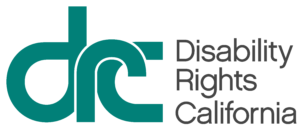Getting Communication Supports Through Medi-Cal
This information was taken from Disability Rights California (DRC) publication #7151.01. It was last updated October 1, 2019. For more information, visit DRC’s Self-Advocacy Publication Hub.
Disclaimer: These materials are based on the law at the time we write them. We try to update our materials; however, laws are regularly changing. If you want to make sure the law has not changed, contact DRC or another legal source.
Did you know that if you get Medi-Cal and your disability makes it hard for you to communicate, Medi-Cal might pay for communication supports that you need?
1. What is Medi-Cal?
Medi-Cal is California’s Medicaid program. Medi-Cal provides health care coverage to many low-income people. If you get Supplemental Security Income (SSI), you automatically get Medi-Cal. Medi-Cal is not just for getting medicine or going to the doctor. Medi-Cal can also include services and devices you need to communicate.
2. What are communication supports?
“Communication supports” are devices or services that help a person with a disability to communicate. Communication supports are sometimes called Augmentative Communication Devices (ACD), Augmentative and Alternative Communication (AAC), Assistive Technology (AT), or Durable Medical Equipment (DME).
3. Do I have a right to get communication supports from Medi-Cal?
Yes. Medi-Cal will pay for a communication support if your doctor decides that it is “medically necessary” for you. Generally, services, supplies and devices are considered “medically necessary” when they are “reasonable and necessary to protect life, to prevent significant illness or significant disability, or to alleviate severe pain.” For children under age 21, “medically necessary” means “necessary to correct or ameliorate defects and physical and mental illnesses and conditions.”
In most cases, Medi-Cal has to agree to pay for the item first before you can get it. This is called “prior authorization.” Among other things, prior authorization can include a letter from a doctor or a therapist that says you have a medical need for the item. As well, Medi-Cal will only pay for the lowest cost item that will meet your needs.
Here are some examples of communication supports that you might be able to get from Medi-Cal:
- Dynavox and other Speech Generating Devices (SGDs);
- PECs and other forms of picture-based communication systems;
- Letter boards or alphabet boards;
- Computer tablets, like an iPad, if it is used as a communication device;
- Services related to evaluation or therapy to learn how to use a device.
If the type of communication support you need is not available directly through Medi-Cal, you can still request it from your doctor or other health care provider as a “reasonable accommodation.” This might include sign language interpreters, communication partners, or documents in braille or large print.
For more information on the right to effective communication from government programs like Medi-Cal, see U.S. Department of Justice, ADA Requirements: Effective Communication, https://www.ada.gov/effective-comm.htm.
4. How do I get the communication supports that I need?
Speak with your doctor,occupational therapist or other health care provider about your needs and ask them to submit an authorization request to Medi-Cal for you.
5. What can I do if Medi-Cal decides that I cannot get the communication supports that I need?
You can appeal. If you are not happy with Medi-Cal’s decision, you can ask for a Medi-Cal fair hearing. If you are in a Medi-Cal managed care plan, you can file a grievance with the plan and ask for a fair hearing if you are not happy with the plan’s decision. If you are in a managed care plan, you may be able to also request an independent medical review (IMR) with the California Department of Managed Health Care (DMHC). If you want to request an IMR, you usually have to file an appeal first with the managed care plan. You can go to this link for more information: http://www.dhcs.ca.gov/services/medi-cal/Pages/Medi-CalFairHearing.aspx. If you have any questions about your appeal rights, you can also call Disability Rights California.



